- Home
- H. Beam Piper
Uller Uprising Page 9
Uller Uprising Read online
Page 9
V.
You Can Depend on It It's Wrong
Gongonk Island, with its blue-gray Company buildings, and the Terrangreen of the farms, and the spaceport with its ring of mooring-pylonsempty since the _City of Pretoria_ had lifted out, two days before,for Terra, was dropping away behind. Von Schlichten held his lighterfor Paula Quinton, then lit his own cigarette.
"I was rather horrified, Friday afternoon, at the way you and ColonelO'Leary and Mr. Blount were blaspheming against Stanley-Browne," shesaid. "His book is practically the sociographers' Koran for thisplanet. But I've been checking up, since, and I find that everybodywho's been here any length of time seems to deride it, and it's fullof the most surprising misstatements. I'm either going to make myselffamous or get burned at the stake by the Extraterrestrial SociographicSociety after I get back to Terra. In the last three months, I've beenreally too busy with Ex-Rights work to do much research, but I'mbeginning to think there's a great deal in Stanley-Browne's book thatwill have to be reconsidered."
"How'd you get into this, Miss Quinton?" he asked.
"You mean sociography, or Ex-Rights? Well, my father and mygrandfather were both extraterrestrial sociographers--anthropologistswhose subjects aren't anthropomorphic--and I majored in sociographyat the University of Montevideo. And I've always been in sympathywith extraterrestrial races; one of my great-grandmothers was aFreyan."
"The deuce; I'd never have guessed that, as small and dark as youare."
"Well, another of my great-grandmothers was Japanese," she replied."The family name's French. I'm also part Spanish, part Russian, partItalian, part English ... the usual modern Argentine mixture."
"I'm an Argentino, too. From La Rioja, over along the Sierra deVelasco. My family lived there for the past five centuries. They cameto the Argentine in the Year Three, Atomic Era."
"On account of the Hitler bust-up?"
"Yes. I believe the first one, also a General von Schlichten, was whatwas then known as a war-criminal."
"That makes us partners in crime, then," she laughed. "The Quintonshad to leave France about the same time; they were what was known ascollaborationists."
"That's probably why the Southern Hemisphere managed to stay out ofthe Third and Fourth World Wars," he considered. "It was full of thedescendants of people who'd gotten the short end of the Second."
"Do you speak the Kragan language, general?" she asked. "I understandit's entirely different from the other Equatorial Ulleran languages."
"Yes. That's what gives the Kragans an entirely different semanticorientation. For instance, they have nothing like a subject-predicatesentence structure. That's why, Stanley-Browne to the contrarynotwithstanding, they are entirely non-religious. Their languagehasn't instilled in them a predisposition to think of everything asthe result of an action performed by an agent. And they have nodefinite parts of speech; any word can be used as any part of speech,depending on context. Tense is applied to words used as nouns, notwords used as verbs; there are four tenses--spatial-temporal present,things here-and-now; spatial present and temporal remote, things whichwere here at some other time; spatial remote and temporal present,things existing now somewhere else, and spatial-temporal remote,things somewhere else some other time."
"Why, it's a wonder they haven't developed a Theory of Relativity!"
"They have. It resembles ours about the way the Wright Brothers'airplane resembles this aircar, but I was explaining theKeene-Gonzales-Dillingham Theory and the older Einstein Theory to KingKankad once, and it was beautiful to watch how he picked it up. Halfthe time, he was a jump ahead of me."
The aircar began losing altitude and speed as they came in overKraggork Swamp; the treetops below blended into a level plain ofyellow-green, pierced by glints of stagnant water underneath andbroken by an occasional low hillock, sometimes topped by a stockadedvillage.
"Those are the swamp-savages' homes," he told her. "Most of what youfind in Stanley-Browne about them is fairly accurate. He spent a lotof time among them. He never seems to have realized, though, that theyare living now as they have ever since the first appearance ofintelligent life on this planet."
"You mean, they're the real aboriginal people of Uller?"
"They and the Jeel cannibals, whom we are doing our best toexterminate," he replied. "You see, at one time, the dominant type ofmobile land-life was the thing we call a shellosaur, a big thing,running from five to fifteen tons, plated all over with silicateshell, till it looked like a six-legged pine-cone. Some wereherbivores and some were carnivores. There are a few left, in remoteplaces--quite a few in the Southern Hemisphere, which we haven'texplored very much. They were a satisfied life-form. Outside of avolcano or an earthquake or an avalanche, nothing could hurt ashellosaur but a bigger shellosaur.
"Finally, of course, they grew beyond their sustenance-limit, but inthe meantime, some of them began specializing on mobility instead ofarmor and began excreting waste-matter instead of turning it to shell.Some of these new species got rid of their shell entirely. _Parahomosapiens Ulleris_ is descended from one of these.
"The shellosaurs were still a serious menace, though. The ancestors ofthe present Ulleran, the proto-geeks, when they were at about the JavaApe-Man stage of development, took two divergent courses to escape theshellosaurs. Some of them took to the swamps, where the shellosaurswould sink if they tried to follow. Those savages, down there, arestill living in the same manner; they never progressed. Othersencountered problems of survival which had to be overcome byinvention. They progressed to barbarism, like the people of thefishing-villages, and some of them progressed to civilization, likethe Konkrookans and the Keegarkans.
"Then, there were others who took to the high rocks, where theshellosaurs couldn't climb. The Jeels are the primitive, originalexample of that. Most of the North Uller civilizations developed frommountaineer-savages, and so did the Zirks and the other northernplains nomads."
"Well, how about the Kragans?" Paula asked. "Which were they?"
Von Schlichten was scanning the horizon ahead. He pulled over a pairof fifty-power binoculars on a swinging arm and put them where shecould use them.
"Right ahead, there; just a little to the left. See that brown-grayspot on the landward edge of the swamp? That's King Kankad's Town.It's been there for thousands of years, and it's always been Kankad'sTown. You might say, even the same Kankad. The Kragan kings havealways provided their own heirs, by self-fertilization. That's acomplicated process, involving simultaneous male and femalemasturbation, but the offspring is an exact duplicate of the singleparent. The present Kankad speaks of his heir as 'Little Me,' which isa fairly accurate way of putting it."
He knew what she was seeing through the glasses--a massive butte offlint, jutting out into the swamp on the end of a sharp ridge, with acity on top of it. All the buildings were multi-storied, some pilingupward from the top and some clinging to the sides. The highwatchtower at the front now carried a telecast-director, aimed at anautomatic relay-station on an unmanned orbiter two thousand milesoff-planet.
"They're either swamp-people who moved up onto that rock, or they'remountaineers who came out that far along the ridge and stopped," shesaid. "Which?"
"Nobody's ever tried to find out. Maybe if you stay on Uller longenough, you can. That ought to be good for about eight to ten honorarydoctorates. And maybe a hundred sols a year in book royalties."
"Maybe I'll just do that, general.... What's that, on the littleisland over there?" she asked, shifting the glasses. "A clump offlat-roofed buildings. Under a red-and-yellow danger-flag."
"That's Dynamite Island; the Kragans have an explosives-plant there.They make nitroglycerine, like all the thalassic peoples; they alsomake TNT and catastrophite, and propellants. Learned that from us, ofcourse. They also manufacture most of their own firearms, some of thempretty extreme--up to 25-mm for shoulder rifles. Don't ever fire one;it'd break every bone in your body."
"Are they that much stronger than us?"
He shook hi
s head. "Just denser, heavier. They're about equal to us inweight-lifting. They can't run, or jump, as well as we can. We oftencome out here for games with the Kragans, where the geeks can't watchus. And that reminds me--you're right about that being a term ofderogation, because I don't believe I've ever knowingly spoken of aKragan as a geek, and in fact they've picked up the word from us andapply it to all non-Kragans. But as I was saying, our baseball teamhas to give theirs a handicap, but their football team can beat thedaylights out of ours. In a tug-of-war, we have to put two men on ourend for every one of theirs. But they don't even try to play tenniswith us."
"Don't the other natives make their own firearms?"
"No, and we're not going to teach them how. The thalassic peoples herein the Equatorial Zone are fairly good empirical, teaspoon-measure,chemists. Well, no, alchemists. They found out how to makenitroglycerine, and use it for blasting and for bombs and mines, andthey screw little capsules of it on the ends of their arrows. Most oftheir chemistry, such as it is, was learned in trying to preventorganic materials, like wood, from petrifying. Up in the north, whereit gets cold, they learned a lot about metallurgy and ceramics, andabout forced-draft pneumatics, from having to keep fires going allwinter to thaw frozen food. They make air-rifles, to shoot metaldarts."
The aircar came in, circling slowly over the town on the big rock, andlet down on the roof of the castle-like building from which thewatchtower rose. There were a dozen or so individuals waiting forthem--the five Terrans, three men and two women, from the telecaststation, and the rest Kragans. One of these, dark-skinned but withspeckles no darker than light amber, armed only with a heavy dagger,came over and clapped von Schlichten on the shoulder, grinningopalescently.
"Greetings, Von!" he squawked in Kragan, then, seeing Paula, switchedover to the customary language of the Takkad Sea country. "It makeshappiness to see you. How long will you stay with us?"
"Till the _Aldebaran_ gets in from Konkrook, to pick up the rifles,"von Schlichten replied, in Lingua Terra. He looked at his watch. "Twohours and a half ... Kankad, this is Paula Quinton; Paula, KingKankad."
He took out his geek-speaker and crammed it into his mouth. Before anyother race on Uller, that would have been the most shocking sort ofbad manners, without the token-concealment of the handkerchief. Kankadtook it as a matter of course. At some length, von Schlichtenexplained the nature of Paula's sociographic work, her connection withthe Extraterrestrials' Rights Association, and her intention of goingto the Arctic mines. Kankad nodded.
"You were right," he said. "I wouldn't have understood all that inyour language. If I had read it, maybe, but not if I heard it." He puthis upper right hand on Paula's shoulder and uttered a clickingapproximation of her name. "I make you one of us," he told her. "Youmust come back, after the work stops at the mines; if you want tolearn about my people, I'll show you what you want to see, and tellyou what you want to know. But why not stay here? Why bother aboutthose geeks at the mines; the Company treats them much better thanthey deserve. Stay here with us; we will make you happy to be withus."
Paula replied slowly: "I thank Kankad, but I must go. Those on Terrawho sent me here want me to learn for myself how the workers at themines are treated. But I will come back--in a hundred, a hundred andfifty days."
Kankad's opal-jeweled grin widened. "Good! We'll be waiting for you."He turned and introduced another Kragan, about his own age, who worethe equipment and insignia of a Company native-major and was freshlypainted with the Company emblem. "This is Kormork. He and I have borneyoung to each other. Kormork, you watch over Paula Quinton." Hemanaged, on the second try, to make it more or less recognizable."Bring her back safe. Or else find yourself a good place to hide."
Kankad introduced the rest of his people, and von Schlichtenintroduced the Terrans from the telecast-station. Then Kankad lookedat the watch he was wearing on his lower left wrist.
"We will have plenty of time, before the ship comes, to show Paula thetown," he suggested. "Von, you know better than I do what she wouldlike to see."
He led the way past a pair of long 90-mm guns to a stone stairway. VonSchlichten explained, as they went down, that the guns of KingKankad's Town were the only artillery above 75-mm on Uller innon-Terran hands. They climbed into an open machine-gun carrier andstrapped themselves to their seats, and for two hours King Kankadshowed her the sights of the town. They visited the school, whereyoung Kragans were being taught to read Lingua Terra and studied fromtextbooks printed in Johannesburg and Sydney and Buenos Aires. Kankadshowed her the repair-shops, where two-score descendants of Kraganriever-chieftains were working on contragravity equipment, under thesupervision of a Scottish-Afrikaner and his Malay-Portuguese wife; thesmall-arms factory, where very respectable copies of Terran rifles andpistols and auto-weapons were being turned out; the machine-shop; thephysics and chemistry labs; the hospital; the ammunition-loadingplant; the battery of 155-mm Long Toms, built in Kankad's own shops,which covered the road up the sloping rock-spine behind the city; theprinting-shop and book-bindery; the observatory, with a big telescopeand an ingenious orrery of the Beta Hydrae system; the nuclear-powerplant, part of the original price for giving up brigandage.
Half an hour before the ship from Konkrook was due, they had arrivedat the airport, where a gang of Kragans were clearing a berth for the_Aldebaran_. From somewhere, Kankad produced two cold bottles of CapeTown beer for Paula and von Schlichten, and a bowl of some boiling-hotblack liquid for himself. Von Schlichten and Paula lit cigarettes;between sips of his bubbling hell-brew, Kankad gnawed on the stalk ofsome swamp-plant. Paula seemed as much surprised at Kankad's disregardfor the eating taboo as she had been at von Schlichten's open floutingof the convention of concealment when he had put in his geek-speaker.
"This is the only place on Uller where this happens," von Schlichtentold her. "Here, or in the field when Terran and Kragan soldiers aretogether. There aren't any taboos between us and the Kragans."
"No," Kankad said. "We cannot eat each others' food, and because ourbodies are different, we cannot be the fathers of each others' young.But we have been battle-comrades, and worksharers, and we have learnedfrom each other, my people more from yours than yours from mine.Before you came, my people were like children, shooting arrows atlittle animals on the beach, and climbing among the rocks atdare-me-and-I-do, and playing war with toy weapons. But we are growingup, and it will not be long before we will stand beside you, as thegrown son stands beside his parent, and when that day comes, you willnot be ashamed of us."
It was easy to forget that Kankad had four arms and a rubbery,quartz-speckled skin, and a face like a lizard.
"I have always wished that some of your people could come to Terra, tostudy," von Schlichten said. "I was talking about it with SidHarrington, only a short while ago. He thinks it would be a goodthing, for your people and for mine."
"Yes. I want Little Me, when he's old enough to travel, to visit yourworld," Kankad said. "And some of the other young ones. And whenLittle Me is old enough to take over the rule of our people, I wouldlike to go to Terra, myself."
"Some day, I am going to return to Terra; I would like to have youmake the trip with me," von Schlichten said.
"That would be wonderful, Von!" Kankad exclaimed. "I want to see yourworld, before I die. It must be a wonderful place. A world is what itspeople make it, and your people must be able to make anything of yourworld that you would want."
"We almost made a lifeless desert, like the poles of Uller, out of ourworld, once," von Schlichten told him. "Four hundred and more yearsago, we fought great wars among ourselves, with weapons such as I hopewill never even be thought of on Uller. Our whole Northern Hemisphere,where our greatest nations were, was devastated; much of it iswasteland to this day. But we put an end to that folly in time; wemade one nation out of all our people, and swore never to commit suchcrimes again, and then we built the ships that took us out to thestars. But I want you to see our world, and some of the other worldsthat we have visited, I th
ink you would like it."
"I know I would. And with you to tell me what the things I would seemeant...." Kankad was silent for a moment. Then he spoke again,changing the subject abruptly.
"I hope Paula will pardon me, but isn't Paula the kind of Terran thatbears young?"
"That's right, Kankad. I never bore any, yet, but that's the kind ofTerran I am."
"I like Paula," Kankad said. "She has come all the way from Terra tohelp us, and to learn about us. Of course, the Kragans don't need thatkind of help, and the geeks, who would stick a knife in her as soon asshe turned her back on them, don't deserve it. But she wants to learnabout us, just as I want to learn about Terra. Von, why don't you andPaula have young?" he asked. "I think that would be fine. Then, LittlePaula-Von and Little Me could be friends, long after the three of usare dead and gone."

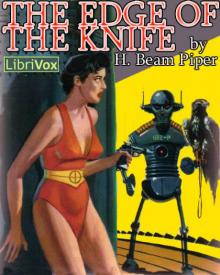 The Edge of the Knife
The Edge of the Knife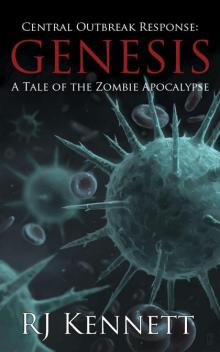 Genesis
Genesis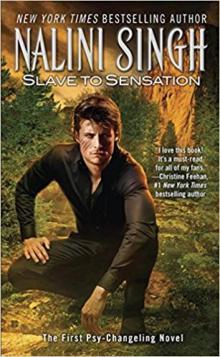 A Slave is a Slave
A Slave is a Slave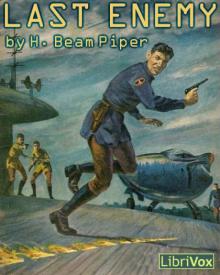 Last Enemy
Last Enemy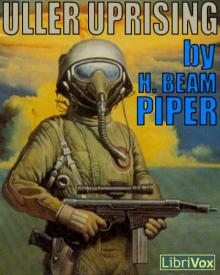 Uller Uprising
Uller Uprising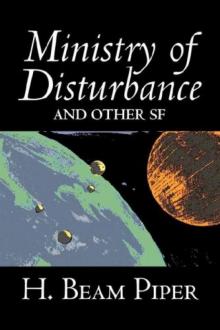 Ministry of Disturbance
Ministry of Disturbance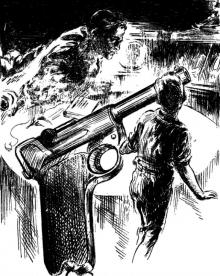 Time and Time Again
Time and Time Again The Mercenaries
The Mercenaries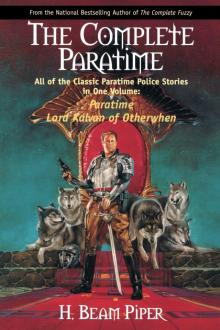 Police Operation
Police Operation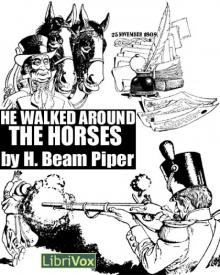 He Walked Around the Horses
He Walked Around the Horses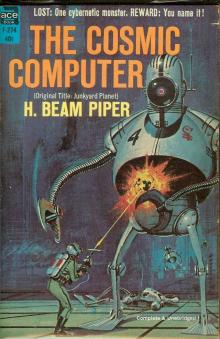 Time Crime
Time Crime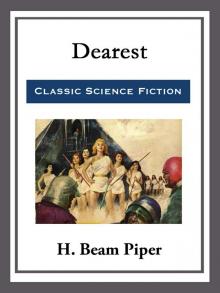 Dearest
Dearest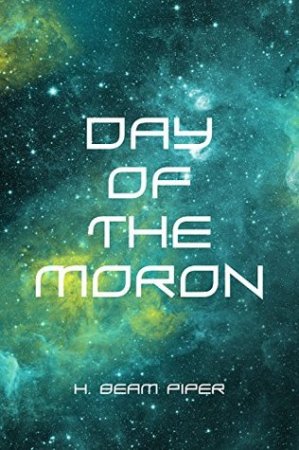 Day of the Moron
Day of the Moron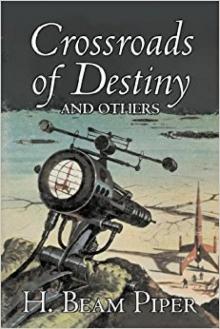 Crossroads of Destiny
Crossroads of Destiny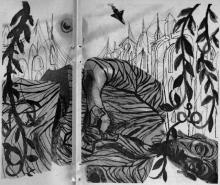 Graveyard of Dreams
Graveyard of Dreams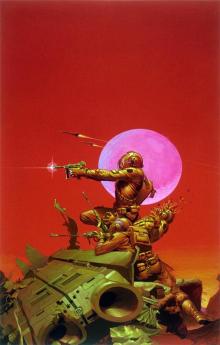 The Cosmic Computer
The Cosmic Computer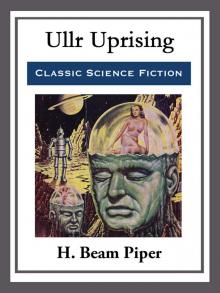 Ullr Uprising
Ullr Uprising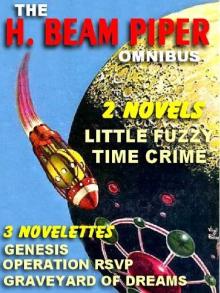 Operation R.S.V.P.
Operation R.S.V.P.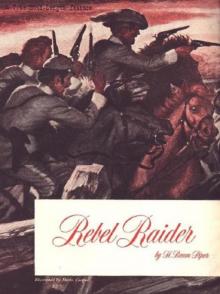 Rebel Raider
Rebel Raider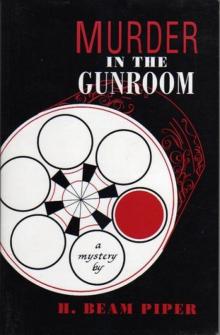 Murder in the Gunroom
Murder in the Gunroom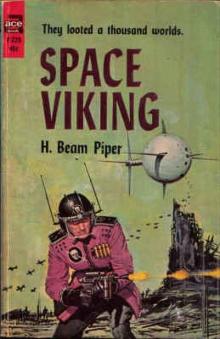 Space Viking
Space Viking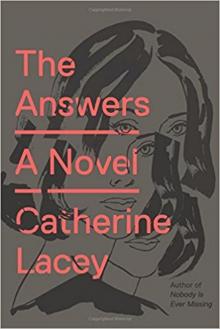 The Answer
The Answer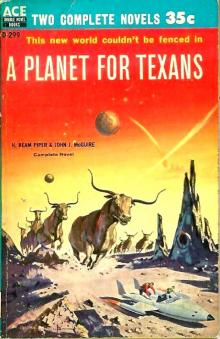 A Planet for Texans (aka Lone Star Planet)
A Planet for Texans (aka Lone Star Planet)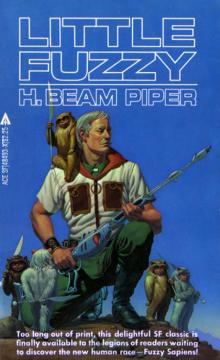 Little Fuzzy
Little Fuzzy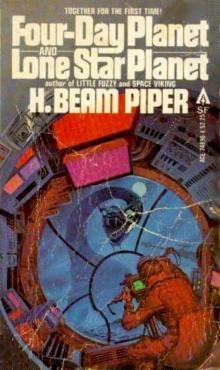 Four-Day Planet
Four-Day Planet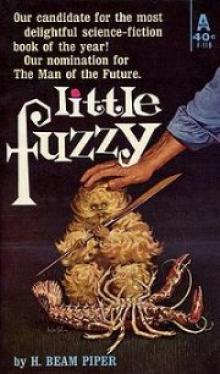 Little Fuzzy f-1
Little Fuzzy f-1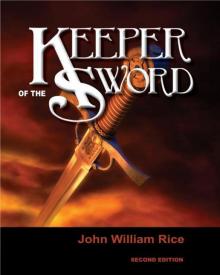 Keeper
Keeper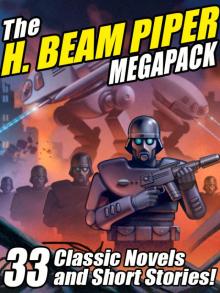 The H. Beam Piper Megapack
The H. Beam Piper Megapack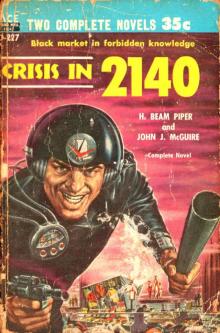 H. Beam Piper
H. Beam Piper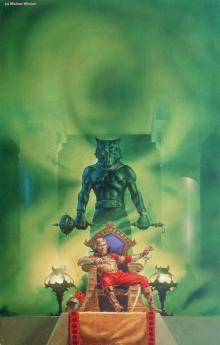 Lord Kalvan of Otherwhen
Lord Kalvan of Otherwhen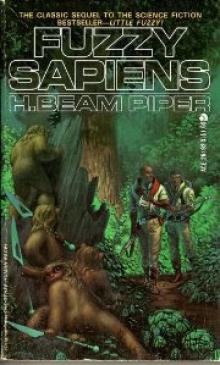 Fuzzy Sapiens f-2
Fuzzy Sapiens f-2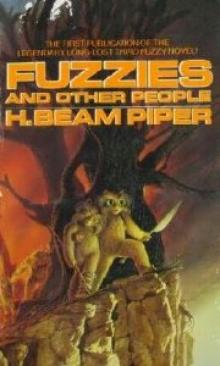 Fuzzies and Other People f-3
Fuzzies and Other People f-3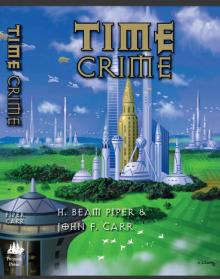 TIME PRIME
TIME PRIME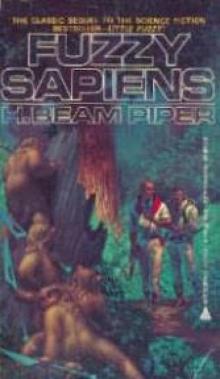 Fuzzy Sapiens
Fuzzy Sapiens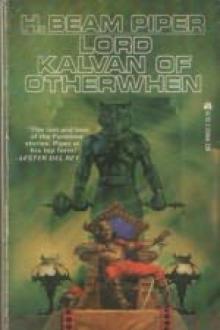 Lord Kalvan of Otherwhen k-1
Lord Kalvan of Otherwhen k-1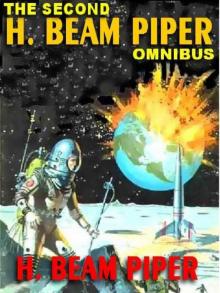 The Second H. Beam Piper Omnibus
The Second H. Beam Piper Omnibus